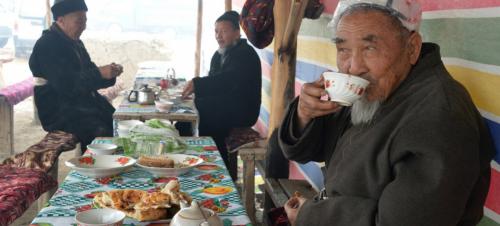International Tea Day: Trusty cuppa represents ‘crux’ of today’s issues – UN General Assembly president
Art, culture, heritage, and a source of livelihood for millions. Because tea is so much more than just a drink, on Thursday, at a virtual event commemorating the first-ever International Tea Day, the president of the UN General Assembly lauded the plant for its role in pursuing the 2030 Agenda for Sustainable Development.

Tea is a cultural and social tradition in Kyrgyzstan.
Against the backdrop of the 74th Assembly’s continued prioritization of action on poverty eradication, climate action and inclusion, Tijjani Muhammad-Bande said: “It is incredible to think that a cup of tea serves as a crux of these most fundamental issues of our time”.
Last year, on 19 December, the General Assembly decided to designate 21 May as International Tea Day to, among other things, raise public awareness of the importance of tea for rural development and sustainable livelihoods.
He called the tea industry “a main source of income and export revenues” for some of the least developed countries, saying that its production and processing constitute “a main source of subsistence and livelihoods” for millions of families in developing countries as one of the most vital cash crops.
Tea export earnings help to finance food import bills, supporting the economies of major tea-producing countries.
Because the plant thrives in specific agro-ecological conditions that are highly vulnerable to climate change, to ensure benefits for both people and the environment, the tea value chain must be sustainable at all stages, from field to cup.
“We must galvanize multilateral collective action to implement activities in favour of the sustainable production and consumption of tea, and join the co-convenors and participants in raising the awareness of importance of tea in fighting hunger and poverty”, Mr. Muhammad-Bande said.
Tea and the SDGs
Tea production and processing directly contributes to several of the Sustainable Development Goals (SDGs), including the first goal, the reduction of extreme poverty; Goal 2, the fight against hunger; Goal 5, the empowerment of women; and Goal 15, the sustainable use of terrestrial ecosystems.
And, tea plays a part in many important traditions, including marriage ceremonies and as formal apologies, according to the Food and Agriculture Organization (FAO).
As we begin the Decade of Action and Delivery to implement the SDGs, the Assembly president called on tea-producing countries to integrate the global goals into their national tea development strategies – with particular emphasis placed on climate action, poverty eradication, zero hunger, gender equality, and the sustainable use of terrestrial ecosystems.
In closing, he looked forward to continued collaboration on these priority areas, with the expectation that tea will continue to hold prominence throughout cultures for generations to come.
“Let us not forget”, he concluded, “there is little that cannot be solved in conversation over a cup of tea”.
Source:UN
- 230 reads
Human Rights
Ringing FOWPAL’s Peace Bell for the World:Nobel Peace Prize Laureates’ Visions and Actions

Protecting the World’s Cultural Diversity for a Sustainable Future

The Peace Bell Resonates at the 27th Eurasian Economic Summit

Declaration of World Day of the Power of Hope Endorsed by People in 158 Nations

Puppet Show I International Friendship Day 2020

